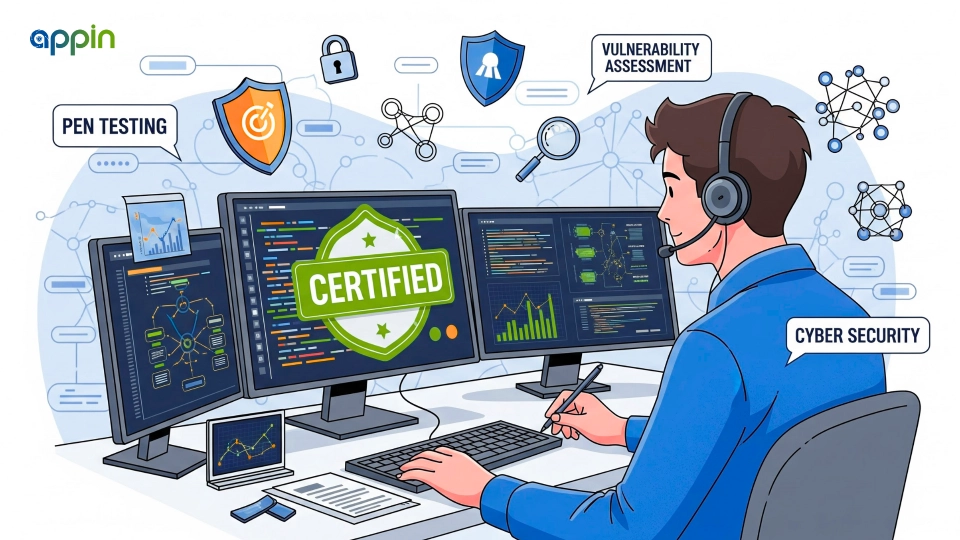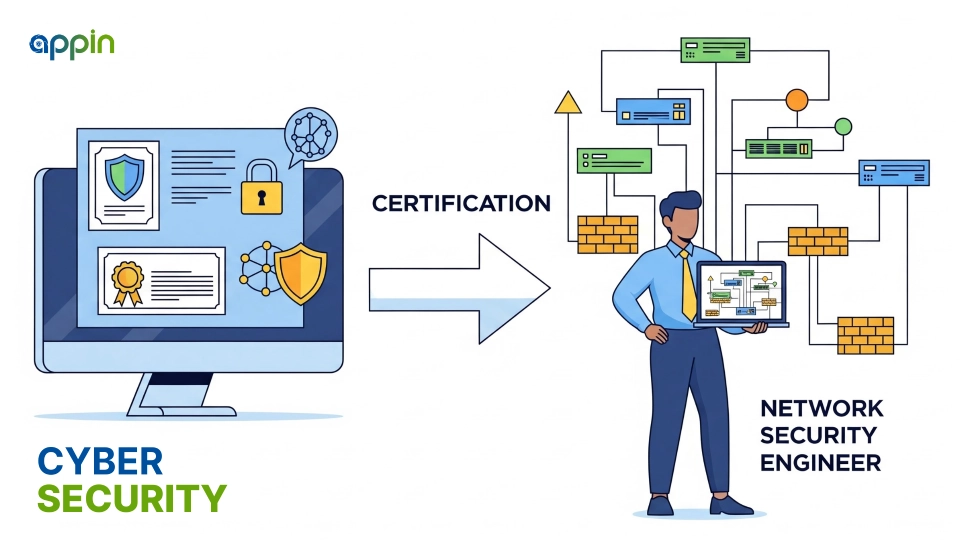Why Cybersecurity Certifications Lead to the Highest-Paying Jobs?
The demand for professionals in highest-paying cybersecurity jobs is growing rapidly as companies face more advanced threats. In India, organizations struggle to find skilled talent, which creates opportunities for students and fresh graduates who hold recognized certifications.
Cybersecurity certifications are proof that you have both the technical and practical skills employers need. They show that you are job-ready, not just academically trained. This makes certifications a direct pathway to competitive salaries and stable careers in cybersecurity jobs in India.
From entry-level roles like Security Analyst to leadership positions like Chief Information Security Officer (CISO), certifications open doors across industries. They not only improve your knowledge but also increase trust with employers who prefer certified candidates over uncertified ones.
In this blog, we will explore 8 career roles you can target after a cybersecurity certification and explain why they are considered some of the most rewarding jobs in the industry.
What is the career scope after a cybersecurity certification?
Certifications expand opportunities by proving your technical and practical knowledge in the cybersecurity field.
For beginners, the career after cybersecurity certification is wide because companies actively seek professionals who can secure data, networks, and applications. A certification demonstrates that you understand both the theory and the tools required to detect and prevent attacks.
Key cybersecurity certification benefits include:
- Better chances of landing entry-level roles such as analyst or support engineer.
- Higher credibility compared to non-certified candidates.
- Increased salary potential across multiple industries.
- A foundation for pursuing advanced certifications and leadership roles.
Employers trust certified candidates because they know these professionals are trained to handle real challenges. Without certification, many students struggle to prove their knowledge in interviews. With one, you gain an edge that shows you are serious about your career.
If you are exploring this path, a Cyber Security Certification is a strong first step. It helps you develop the skills employers value most, including monitoring systems, handling incidents, and understanding compliance standards.
In short, the career scope after completing a certification is not limited to one role but stretches across analyst, consultant, engineer, and leadership positions, depending on how you grow.
How does a cybersecurity certification help you become a Security Analyst?
A certification helps you become a Security Analyst by preparing you to monitor networks, detect threats, and respond to incidents effectively.
The security analyst role is one of the most common entry points in cybersecurity. Analysts are responsible for watching over systems, reviewing alerts, and identifying suspicious activity. Certifications make you eligible for such entry-level cybersecurity jobs because they provide both theoretical knowledge and practical training.
Typical responsibilities of a Security Analyst include:
- Monitoring network traffic and analyzing logs.
- Identifying vulnerabilities and potential breaches.
- Coordinating with IT teams to fix security gaps.
- Preparing reports for management on threats and trends.
Employers prefer candidates with certifications because it assures them that you can use security tools like SIEM systems, firewalls, and intrusion detection systems. For fresh graduates, this role provides hands-on exposure that builds a foundation for more advanced jobs later.
Becoming a Security Analyst after certification is an excellent way to enter the field. It offers stability, growth potential, and a clear path to roles like Penetration Tester, Incident Responder, or Security Consultant as you gain experience.
Can you work as a Penetration Tester after certification?
Yes, you can work as a Penetration Tester after certification because it equips you with the skills to ethically test systems for vulnerabilities.
A Penetration Tester is often called an ethical hacker. The role involves simulating attacks on systems to find weaknesses before cybercriminals can exploit them. Certifications make you eligible for penetration tester jobs by validating your technical knowledge.
Key responsibilities of a Penetration Tester include:
- Performing controlled attacks to identify flaws in applications, networks, and databases.
- Writing reports that explain vulnerabilities and how to fix them.
- Working with security teams to strengthen defenses.
Employers look for certified professionals because penetration testing requires both skill and responsibility. Without proper training, testing can cause harm instead of helping. With a certification, you can build a safe and legal ethical hacking career.
A great place to begin is through Certified Ethical Hacking, which gives you structured learning in tools, methodologies, and real-world attack simulations. This makes it easier to transition from a beginner into a professional penetration tester.
With high demand and competitive salaries, penetration testing remains one of the most attractive paths after a cybersecurity certification.
What makes Cybersecurity Consultant a high-paying role?
A Cybersecurity Consultant is a high-paying role because businesses rely on their advice to design strong security policies and prevent costly breaches.
Consultants act as advisors who guide organizations on how to protect their digital assets. They analyze systems, recommend improvements, and help companies comply with security standards. This is why the cybersecurity consultant salary is often higher than analyst or engineer positions.
Main tasks of a consultant include:
- Assessing risks in IT infrastructure.
- Designing policies for data protection and access control.
- Training staff on security awareness.
- Advising on investments in tools and services.
Employers value certified consultants because they trust their ability to deliver professional guidance. In India, demand for cybersecurity consultant in India is growing as companies shift to digital platforms and face rising cyber threats.
Unlike analysts who focus on monitoring, consultants focus on strategy. They often work with multiple clients, which gives them both higher exposure and better pay.
This role is ideal for professionals who want to combine technical knowledge with communication and advisory skills. Certifications help you stand out and build credibility as someone companies can rely on for expert advice.
How does a certification lead to a Network Security Engineer role?
A certification leads to a Network Security Engineer role by proving that you can design, maintain, and protect secure network systems.
The role of a Network Security Engineer is critical because most cyberattacks target networks and communication channels. With certification, you demonstrate the skills needed for network security engineer jobs, which are in demand across industries.
Typical tasks include:
- Configuring and managing firewalls, VPNs, and security appliances.
- Monitoring network traffic for unusual activity.
- Implementing security measures to prevent intrusions.
- Ensuring data flows securely between users and systems.
Employers often look for certified candidates because they want assurance that you understand the tools and processes needed to secure networks. This is where certifications help you stand out from other applicants.
A network defense career is especially suitable for students who enjoy working with systems, routers, and security tools. It also offers strong growth potential, as organizations continue to expand their networks and rely more on digital infrastructure.
For fresh graduates, this role provides a hands-on path into cybersecurity, combining technical skills with real responsibility for protecting company assets.
Can you become an Incident Responder with a certification?
Yes, you can become an Incident Responder with a certification because it trains you to identify, investigate, and manage security breaches.
An Incident Responder is the first line of defense during an attack. The role focuses on containing threats, reducing damage, and learning from incidents to prevent future ones. Employers prefer certified candidates for incident responder roles because these jobs require quick decision-making and a structured approach.
Key duties include:
- Analyzing alerts to confirm if an attack is real.
- Containing and isolating affected systems.
- Investigating how the breach happened.
- Documenting incidents and recommending improvements.
Companies hire certified responders because they cannot risk mistakes during an active cyberattack. With certification, you show that you understand industry best practices and can follow incident handling procedures.
For students, pursuing incident handling jobs offers a dynamic and challenging career. It is well-suited for those who enjoy solving problems under pressure and want to play a direct role in defending organizations.
In short, certifications prepare you with the knowledge and confidence to step into this critical role, where every action can make a difference in protecting data and systems.
What does a Cloud Security Specialist do after certification?
A Cloud Security Specialist protects cloud-based systems and data, and a certification helps you qualify for these roles in a growing job market.
As more organizations move their operations to the cloud, demand for professionals with cloud expertise is rising. Certifications validate your knowledge of securing platforms like AWS, Azure, and Google Cloud, which makes you a strong candidate for cloud security jobs in India.
Core responsibilities of a Cloud Security Specialist include:
- Configuring cloud environments to meet security standards.
- Monitoring access and preventing unauthorized logins.
- Encrypting sensitive data stored in the cloud.
- Managing compliance with industry regulations.
This role is highly rewarding because cloud systems store critical business data. Salaries for cloud security specialist positions are also competitive, reflecting the importance of protecting remote infrastructure.
For students, certification ensures that you understand cloud-specific risks such as misconfigured storage, weak access controls, and insecure APIs. Without these skills, companies face higher risks when adopting cloud platforms.
The career path in cloud security is growing quickly, and certified specialists often find opportunities across finance, healthcare, IT services, and startups. This makes it a future-proof choice for those who want stability and growth.
How can you work as a Security Auditor or Compliance Officer?
You can work as a Security Auditor or Compliance Officer by using your certification to show that you understand regulations, standards, and security frameworks.
Organizations must follow legal and industry rules for data protection. Certified professionals are preferred for security auditor jobs because they know how to evaluate policies and ensure systems are secure.
Typical tasks include:
- Reviewing systems to check if security controls are in place.
- Ensuring compliance with standards like ISO, GDPR, or PCI DSS.
- Writing reports that highlight risks and recommendations.
- Guiding teams on how to meet legal requirements.
As a compliance officer cybersecurity role, you act as the bridge between technical teams and management. Employers rely on you to avoid fines, data breaches, and reputational damage.
Certifications give you credibility in this field because audits and compliance often require proof of structured knowledge. They also make it easier to understand technical reports and communicate findings clearly.
If you are interested in this career path, Appin’s Bug Bounty Diploma can complement your learning by teaching you how vulnerabilities are discovered and reported, which strengthens your ability to audit effectively.
This role is ideal for students who enjoy analysis, reporting, and ensuring organizations stay within the rules while maintaining security.
Can a certification help you grow into a Chief Information Security Officer (CISO)?
Yes, a certification can help you grow into a Chief Information Security Officer (CISO) by building the foundation you need for leadership roles in cybersecurity.
A CISO is the highest-ranking security professional in an organization. They oversee strategy, manage teams, and ensure that security aligns with business goals. Certifications are essential at the start because they provide the knowledge and credibility to begin your journey on the CISO career path.
Key responsibilities of a CISO include:
- Designing and overseeing the company’s entire security framework.
- Managing security budgets and resources.
- Leading incident response during major breaches.
- Reporting risks and strategies to top executives.
While certifications alone will not make you a CISO, they are a critical first step. They open the door to entry-level and mid-level positions that give you the experience required to move up. Over time, combining certifications with leadership experience and strong communication skills prepares you for this role.
In India, the CISO salary in India is among the highest in the cybersecurity field, reflecting the importance of protecting business assets at the leadership level. For ambitious students, this should be seen as a long-term career goal.
What should you remember about cybersecurity certifications and careers?
You should remember that cybersecurity certifications act as a launchpad for careers because they validate your skills and open doors to high-paying jobs.
Throughout this blog, we explored how certifications prepare you for roles such as analyst, penetration tester, consultant, network engineer, incident responder, cloud specialist, auditor, and even CISO. These are some of the most sought-after cybersecurity certification jobs in the industry.
For students and fresh graduates, certifications provide the edge needed to stand out in interviews and qualify for competitive salaries. They also create a structured path for growth, from start cybersecurity career opportunities to advanced leadership roles.
If you are serious about building a future in cybersecurity, getting certified is the smartest first step.
👉 Enquire now with Appin to explore training programs that help you gain the skills and confidence to succeed in this field.





